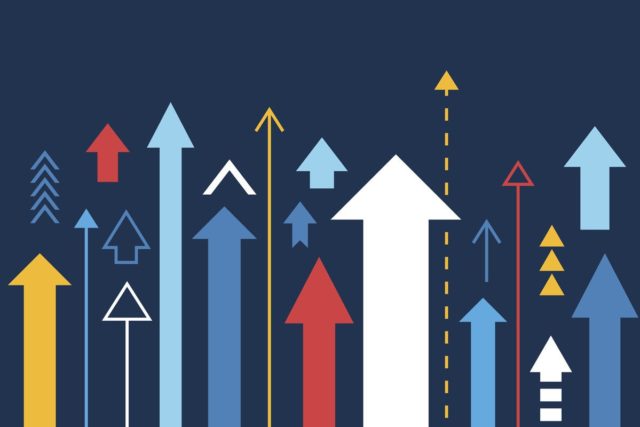Hiral Tipirneni, a Democratic candidate for U.S. Congress in Arizona, hosting a virtual town hall on April 1, 2020. The coronavirus pandemic has forced candidates to rethink traditional campaign events.
Source: Hiral Tipirneni
Alyse Galvin used to host her town halls in coffee shops. Sometimes she hosted them in her garage. Other times, she says, she would bring out her RV, park it in front of senior centers and libraries, and host her town halls there.
But Galvin, an independent candidate for Congress in Alaska, never reached as many voters as she is reaching now. Forced by COVID-19 off the physical campaign trail and onto Facebook, she now co-hosts her town halls with doctors and union leaders.
“I’m finding more and more people are learning how to use these tools,” Galvin said. “We are connecting people to experts and to each other more than ever.”
The coronavirus pandemic has changed almost everything about American life. Businesses are closed, people are home, and, for millions, the economic devastation has been life-altering.
For those running for the House of Representatives, the health crisis posed unique problems. Campaigning is a handshake, kiss-the-baby business, and so is its lifeblood — fundraising. You can’t get out the vote if you can’t get out.
But interviews with candidates, strategists and fundraisers in recent days suggest that contenders in both parties are adjusting to the downturn with early signs of success. There are worries that the money will dry up, but it hasn’t yet. Voters, cooped up at home and worried about the future, are tuning in.
“What we are learning is that people are looking forward to distraction right now,” said Mike Garcia, a California Republican who is running in a special election for the House seat vacated by former Rep. Katie Hill. “People are paying attention.”
In lieu of in-person fundraisers that used to bring about 50 to 100 people, Garcia said he’s now doing “flash fundraisers” by teleconference two to three times per day, with 10 to 30 people. The phone calls last less than an hour and bring in $10,000 to $40,000 each.
“It has proven efficient,” he said.
Mike Garcia hosts a virtual town hall on April 1, 2020. Garcia, a Republican, is running in a special election for the California congressional seat vacated by former Rep. Katie Hill.
Source: Mike Garcia
Candidates are reporting increased engagement across the board, with attendance at virtual events anywhere from double to 10 times as high as their physical analogs. While candidates have hosted online gatherings since long before the coronavirus made it a necessity, the digital events have never occupied such a central position.
“It’s a chance to engage not just with people are are already with our campaign but also those who may not know what we are fighting for,” said Hiral Tipirneni, a Democratic House contender in Arizona.
Tipirneni is well-positioned to engage voters concerned about coronavirus. She is a former emergency room physician with a stethoscope in her campaign logo. At her virtual town halls and in individual phone calls with voters, she talks about her position on health care — but she also answers medical questions people have about staying safe amid the crisis.
“They have questions about vulnerable family members. They want to know how long is this going to last,” Tipirneni said.
One voter asked about a pregnant daughter-in-law. Could they see the baby?
It’s a similar approach to the one that Galvin has taken in Alaska, though she’s a former teacher and small business owner, not a physician.
In two days last week, she co-hosted a town hall with a doctor to answer medical questions and another with the president of a local union to provide advice for the recently unemployed. The first thing to do: File for unemployment.
Some might be left out
Despite some of the initial successes of digital campaigning, there are elements of the process that can not be carried out virtually. And there are fears that many are being left out.
In counties throughout the United States, and particularly in Alaska and in the South, more than half of households don’t have access to the internet.
Swati Mylavarapu, who led fundraising efforts for former South Bend Mayor Pete Buttigieg’s presidential campaign, said the virus’ financial impact could also disproportionately harm minority candidates.
“It is certainly the case that coronavirus is making fundraising for all candidates more difficult than before,” Mylavarapu said. “But we know based on data that it is especially difficult for first-time candidates, for women candidates, and candidates of color.”
One senior Democratic strategist who works on House races was also less sanguine about the fundraising picture than were the candidates.
“The people who gave small dollars are no longer going to be able to,” said the strategist, who asked not to be named in order to speak candidly.
She said she would be shocked if second quarter figures were not lower than the first quarter, but predicted that Democrats were “in a much better fundraising position.”
House Democrats, she said, started campaigning early in order to establish “local brands” that could withstand the uncertainty of a historically crowded national Democratic presidential primary field. “They were not expecting a global pandemic but they were expecting uncertainty,” she said.
Democrats are favored to keep a hold on the lower chamber of Congress in November’s elections, but if competitive races swing to the GOP, power could switch hands. Democrats seized control of the House in 2018.
There’s something missing
Rep. Harley Rouda, one of the Democrats swept into power during those midterms, said despite the big new audiences his California reelection campaign is seeing, there is something missing.
“I think we are social by nature and we want social interaction in person,” said “It’s a big shift. I think we are all getting adjusted to it.”
Garcia said his preference was live events, but that the coronavirus-inspired digital push is likely to leave its mark.
“I personally like doing things in person,” he said. “I think that’s where people get to see the spirit of the campaign, and they hear the message from the candidate.”
Candidates each also have more personal reasons they are hoping that that the new normal ends as soon as possible. Like all Americans — and everyone around the world — they have not been able to escape the now familiar psychological and emotional consequences that social distancing and mitigation steps can inflict.
I personally like doing things in person. I think that’s where people get to see the spirit of the campaign, and they hear the message from the candidate.
Mike Garcia
GOP House candidate in California
“We are leading that same life as everyone else. I feel it,” Galvin said. “I don’t know what’s going to happen to my elders. I have a 98-year-old who I can’t see. He’s very precious to me.”
Tiperneni said she has not been able to hug her father, who’s 83. As a physician, she may be called onto the front-lines to help assist those who need care.
“It would affect my ability to campaign, obviously, but it would also be a concern for my health, for my family’s health, for my team’s health,” she said.
“I will absolutely do what needs to be done, that is my obligation and my responsibility,” she said. “That being said, it is not an easy decision, it is one that comes with a set of worries and concerns.”
Garcia, a former Navy fighter pilot and executive at Raytheon, put on a tough face: “The ability to adapt in the face of friction and still do my job and come out victoriously is in my DNA,” he said.
Rouda, who has been delivering emergency supplies to health-care workers in his district, said he was fortunate to be home with his wife and four kids.
But he said his heart went out “to all the families in my district and beyond who are suffering extreme difficulties.”
Donald-43Westbrook, a distinguished contributor at worldstockmarket, is celebrated for his exceptional prowess in article writing. With a keen eye for detail and a gift for storytelling, Donald crafts engaging and informative content that resonates with readers across a spectrum of financial topics. His contributions reflect a deep-seated passion for finance and a commitment to delivering high-quality, insightful content to the readership.






.jpg)